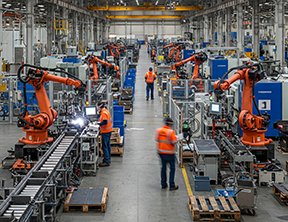Published: December 10, 2015 | Updated: September 23, 2025
Published: December 10, 2015 | Updated: September 23, 2025
Unveiling the Advantages: Why a Manufacturing Career Presents a Promising Path
 Despite some negative portrayals in the news, there are plenty of advantages why a manufacturing career presents a promising path particularly within the United States. It offers personal fulfillment, contributes to national progress, and provides substantial financial rewards. The manufacturing industry actively seeks skilled individuals and offers a dynamic environment ripe with opportunity. Let's delve deeper into the compelling reasons why choosing a manufacturing career can be a strategic and satisfying decision.
Despite some negative portrayals in the news, there are plenty of advantages why a manufacturing career presents a promising path particularly within the United States. It offers personal fulfillment, contributes to national progress, and provides substantial financial rewards. The manufacturing industry actively seeks skilled individuals and offers a dynamic environment ripe with opportunity. Let's delve deeper into the compelling reasons why choosing a manufacturing career can be a strategic and satisfying decision.
The Undeniable Economic Appeal of Manufacturing
The sheer scale of the manufacturing workforce in the United States often goes unacknowledged. Approximately 15 million Americans directly contribute to this vital sector, representing a significant portion–around 10%–of the nation's total employment. Beyond the impressive number of jobs, the earning potential within manufacturing stands out as a major draw. The average annual salary for manufacturing workers surpasses $75,000, considerably higher than the average across all industries, which hovers just above $60,000. This substantial difference underscores a key benefit: manufacturing careers frequently provide a pathway to a comfortable and secure financial future.
Addressing the Critical STEM Skills Gap
Concerns exist regarding the United States' standing as a global innovation leader. Studies indicate a lag in critical areas, particularly in STEM (science, technology, engineering, and math) education and the corresponding job market. While the demand for STEM professionals steadily rises, employers increasingly encounter difficulties in finding candidates with the necessary education and specialized training. This shortage of skilled workers has a dual impact.
Firstly, it amplifies job prospects and earning potential within sectors like manufacturing, which heavily rely on STEM expertise. Secondly, it compels American businesses to look abroad to fill crucial roles, a trend that poses a challenge to the nation's long-term economic competitiveness and the opportunities available for future generations.
The Push for STEM Education
Fortunately, a concerted effort aims to encourage young people to pursue STEM-focused education. Various programs actively guide aspiring workers toward manufacturing careers, with the overarching goal of maintaining America's position as a global innovation powerhouse. This proactive approach recognizes the critical link between a skilled domestic workforce and sustained economic prosperity.
Beyond Finances: The Intrinsic Rewards of Manufacturing
The advantages of a manufacturing career extend beyond purely economic considerations. Many individuals find deep personal satisfaction in this field. Manufacturing professionals are typically hardworking and dedicated individuals who directly contribute to the creation of tangible goods that benefit society. Whether they are involved in producing cutting-edge electronics, life-saving medical devices, or everyday consumer products, there exists a profound sense of accomplishment in being part of the process that brings these items into existence. This tangible contribution fosters a feeling of purpose and connection to the larger world.
Driving Innovation Through Research and Development
Furthermore, the manufacturing sector in the United States plays a pivotal role in driving technological advancement. These companies account for more than three-quarters of all private-sector research and development (R&D) activities within the country. This significant investment in innovation means that individuals with the appropriate education and training have the potential to contribute to groundbreaking discoveries in medicine, technology, and various other fields. Consider the transformative impact of innovations like the smartphone; manufacturing professionals are integral to bringing such world-changing products to life.
 The Role of CMMS in Modern Manufacturing
The Role of CMMS in Modern Manufacturing
Modern manufacturing increasingly relies on sophisticated tools to enhance efficiency and productivity. One such critical tool is a Computerized Maintenance Management System (CMMS). A CMMS is a software platform that helps manage and track maintenance activities, assets, and work orders. Its implementation brings numerous advantages to manufacturing operations.
Enhanced Asset Management
A CMMS provides a centralized database for all equipment and assets within a manufacturing facility. This allows for comprehensive tracking of asset information, including purchase dates, costs, maintenance history, and location. With this detailed information readily accessible, manufacturers can proactively manage their assets, schedule preventative maintenance, and minimize unexpected downtime due to equipment failures. This proactive approach extends the lifespan of equipment and ensures smoother operations.
Improved Maintenance Scheduling and Planning
Gone are the days of reactive maintenance. A CMMS enables manufacturers to schedule maintenance tasks based on usage, time intervals, or condition monitoring. This preventative approach reduces the likelihood of costly breakdowns and allows for better allocation of maintenance resources. Planners can assign tasks to specific technicians, track progress, and ensure that all necessary parts and tools are available when needed. This structured approach improves efficiency and minimizes disruptions to production schedules.
Discover how streamlined maintenance processes can elevate production. Learn more.
Efficient Work Order Management
A CMMS simplifies the entire work order process, from creation to completion. When an issue arises or a maintenance task is scheduled, a work order can be generated electronically, assigned to the appropriate personnel, and tracked through each stage. Technicians can update the status of work orders, record findings, and document any parts used. This digital system eliminates paperwork, improves communication, and provides a clear audit trail of all maintenance activities.
CMMS Reports
The data collected by a CMMS provides valuable insights into equipment performance, maintenance costs, and technician efficiency. Manufacturers can generate reports to identify trends, pinpoint recurring issues, and evaluate the effectiveness of their maintenance strategies. This data-driven approach empowers informed decision-making regarding equipment upgrades, resource allocation, and process improvements, ultimately leading to reduced costs and increased productivity.
How CMMS Benefits Attract Manufacturing Candidates
The implementation and utilization of a CMMS can indirectly contribute to attracting individuals to manufacturing careers. Several aspects of a well-managed, technologically advanced manufacturing environment can appeal to prospective employees.
Demonstrates a Commitment to Technology
The presence of a CMMS signals that a manufacturing company embraces modern technology and innovative solutions. This can be particularly attractive to younger generations entering the workforce who often seek technologically forward-thinking employers. Working with sophisticated software can enhance job satisfaction and provide opportunities for skill development.
Fosters a More Organized and Efficient Workplace
A CMMS contributes to a more organized and efficient work environment. Clearly defined processes for maintenance, readily available information about equipment, and streamlined communication can reduce frustration and improve the overall work experience for maintenance personnel and other employees. This can lead to higher morale and a more positive workplace culture, making the company a more desirable place to work.
Highlights Opportunities for Skill Development and Advancement
Working with a CMMS often requires specific skills in data analysis, software utilization, and problem-solving. Companies that invest in such systems often also invest in training their employees, providing opportunities for professional growth and skill enhancement. This commitment to employee development can be a significant draw for individuals looking to build long-term careers in manufacturing.
In conclusion, while media narratives might sometimes paint a different picture, the manufacturing industry in the United States offers a wealth of compelling opportunities. From competitive salaries and the chance to contribute to vital innovations to the personal satisfaction of creating tangible goods, a career in manufacturing presents a promising path for many. The integration of technologies like CMMS further enhances the appeal of this dynamic sector, creating more efficient, organized, and technologically advanced workplaces that can attract a new generation of skilled professionals.
FAQs
Why is a manufacturing career considered financially rewarding?
Manufacturing careers in the U.S. often offer salaries above $75,000 annually, providing a stable and lucrative path compared to many other industries.
How does STEM education impact opportunities in manufacturing?
Strong STEM skills increase job prospects and earning potential, as modern manufacturing relies heavily on science, technology, engineering, and math expertise.
What personal satisfaction can one gain from a manufacturing career?
Workers contribute to creating tangible products like electronics, medical devices, and consumer goods, fostering a sense of purpose and accomplishment.
How does CMMS improve modern manufacturing operations?
A CMMS centralizes asset management, schedules preventative maintenance, and streamlines work orders, minimizing downtime and enhancing productivity.
Why should manufacturing companies consider MAPCON CMMS?
MAPCON CMMS offers a user-friendly platform that helps track assets, manage maintenance tasks, and generate reports, improving efficiency and workplace organization.
How can CMMS attract new talent to manufacturing?
Implementing CMMS demonstrates technological innovation, supports skill development, and creates an organized, efficient workplace appealing to prospective employees.
MAPCON | 800-922-4336
MAPCON CMMS software empowers you to plan and execute PM tasks flawlessly, thanks to its wealth of features and customizable options. Want to see it for yourself? Click the button below to get your FREE 30-day trial of MAPCON!
Try It FREE!